When Do Puppies Calm Down? At What Age?
If you have recently gotten a puppy, you’ve probably found yourself asking this question once or twice. It might have been when your new little crocodile discovered how tasty and enjoyable your toes are to nibble on or during their 8 pm zoomies when you’re trying to relax but there’s a tornado in your living room preventing that.
Puppyhood doesn’t last forever and it’s difficult to remember to enjoy it at the time but when your dog gets to the grand old age of double figures and starts to slow down, you’re going to miss those pointy little teeth and boundless energy.
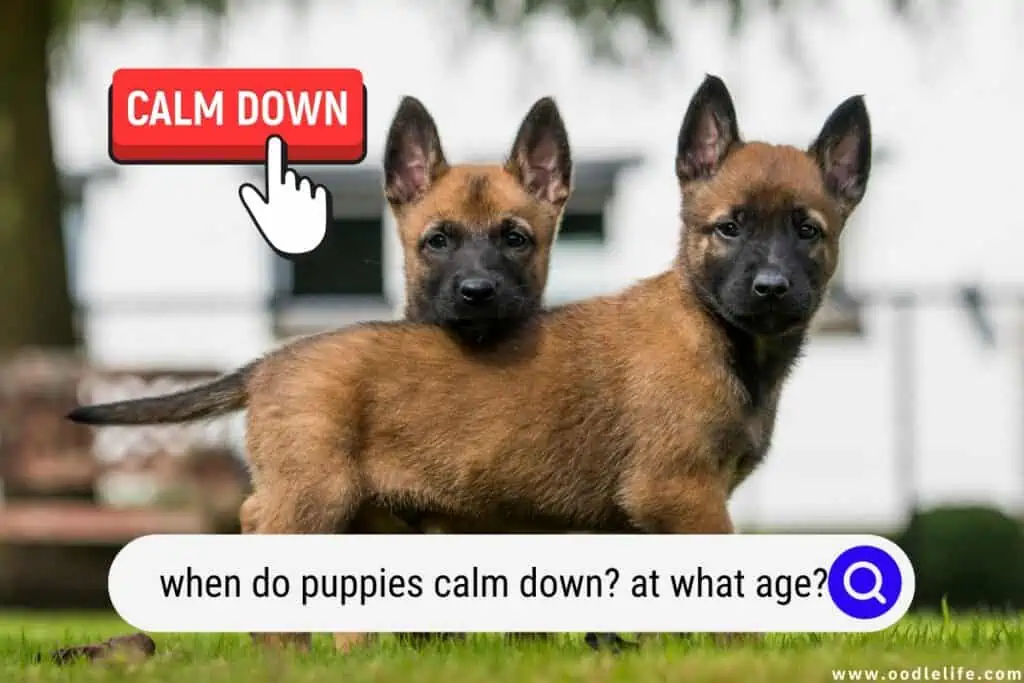
If you’re holding your breath and waiting for your puppy to hit the six-month mark and settle into being a nice, well-adjusted dog, you might be waiting a good bit longer than you first thought. A dog has multiple life stages and the equivalent of their teenage years can last up to two years so you might be waiting longer than you’d like. Waiting for your puppy to calm down can depend on various factors.
Your dog’s age, breed, size, training, and socialization also play a part in this period of their life.
Why Is Your New Puppy So Energetic?
Puppies are energetic. If we were going to compare them to the equivalent of a child’s age, we miss the very cute helpless stage that would be the first year of a baby’s life. This period is spent with their mother while they rely on her for milk, toileting, and warmth.
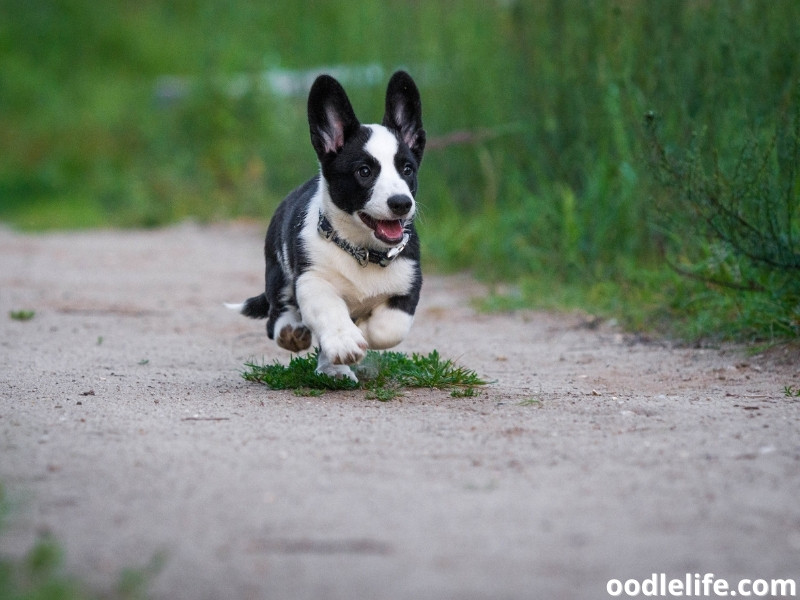
We only take them home when they’re eight weeks old and are much more mobile. You’re essentially bringing home a toddler so it’s no surprise that they have so much energy.
Like children, luckily most puppies tend to burn out quite quickly. You may have a super energetic little terror running around your living room but chances are, within the hour, they’ll be dead asleep on their back and snoring away! Puppies sleep a lot and they sleep hard.
A lot of their energy is needed to grow and develop. Their energy tends to come in short spurts so while they’re doing a lot of sleeping throughout the day, the time they are awake is just more intense. While an adult dog might nap throughout the day and spend the rest of it plodding around and following you or sitting at your feed, puppies only have two modes – very awake or very asleep.
Life Stages of Your Puppy
Puppy
The puppy stage of your dog’s life can last anywhere between six and eighteen months. Initially, puppies are born deaf and blind so they rely on their mothers to fulfill their every need. At this stage, they can’t even regulate their body temperature and will all snuggle together and with their mother to keep warm.

Between two and three weeks, they start to develop their senses with their eyes opening.
From three weeks to about seventeen weeks of age is what is called the critical socialization period. At this age, puppies are quite flexible to new experiences and you should try and introduce anything you want them to be comfortable with. Things like cats, children, and new environments.

Puppies will take quite easily to new experiences when they’re young however beyond seventeen weeks, they may be more likely to respond with fear to something new. Puppies sleep a lot and have lots of energy when they wake up. Puppy owners have a shared experience of zoomies during the evening.
It’s common for puppies to get over tired in the evening like a toddler and will act out by mouthing and being extra chaotic.
Adolescent
Think of a dog’s adolescence like having a teenager living in your house. When they hit six months old they’re not likely to just calm down and a lot of your good work might go right out the window. When I used to teach training classes we would prewarn owners that they should expect a training hiccup whenever their puppies hit their adolescents.
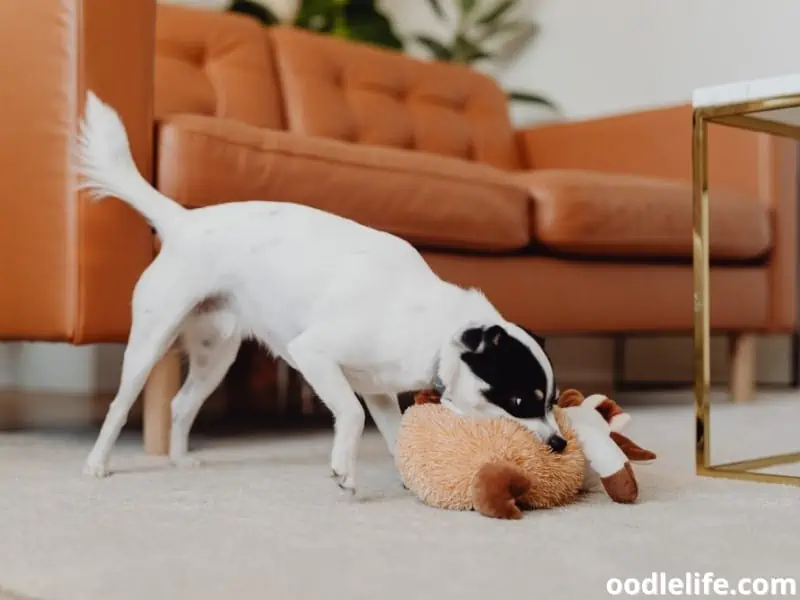
At around six months of age, they’re suddenly flooded with hormones so you might find that they’re pushing boundaries more than they used to and forget their training.
You might have trained your puppy a really good recall but once they become an adolescent they might get a surge of confidence and decide they no longer need you as much and wonder further and further away. During this period they may do things like answer back, especially if they’re a particularly vocal breed. Huskies will tent to find their voice at this age which is around the time they never stop chatting to you!
The adolescent stage of a dog is easily the most challenging for owners which is why you shouldn’t expect your dog to calm down too much during this period. They’re going through a lot of physical and hormonal changes and need a level of understanding to cope with them.
Adult
You can consider a dog to be an adult at the earliest around eighteen months up until about three years old depending on the size and breed of the dog. Smaller breeds will mature faster as they reach their full size quicker and may be considered an adult around eighteen months. This means you can count on your Chihuahua to calm down somewhat, but if you have a Labrador you’re not likely to see them mature until two and a half to three years old.
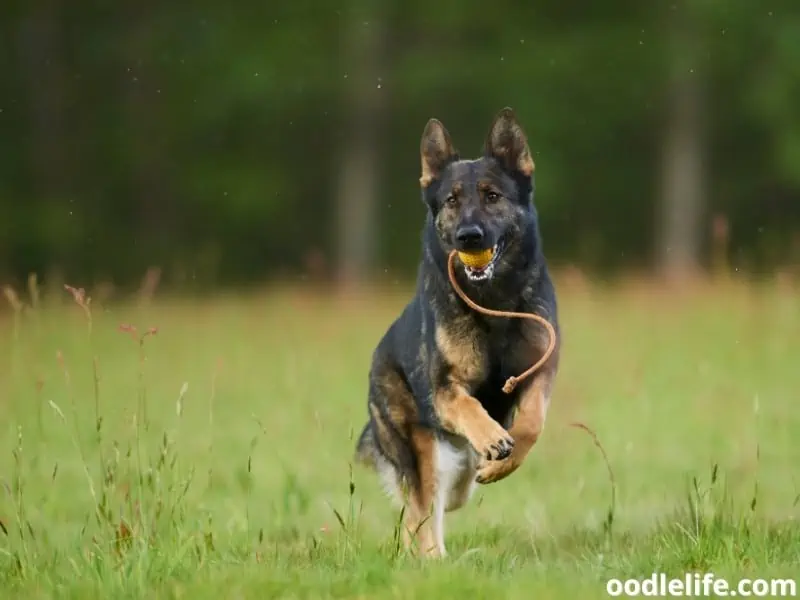
Even when your dog calms down, a Labrador is still an energetic breed so it’s not like you can expect a sedentary dog but just one without hormonal energy spurts.
As they get older they will naturally calm down but that doesn’t mean they don’t need the training to help them get there and make the process more smooth. A dog with little training or socializing will likely still be more hyperactive than one who has had some amount of training, even if they are younger.
Senior
Your dog will continue to slow down as they get older. Dogs are generally considered to be senior when they reach the age of eight although depending on the breed they can live for a lot longer than this. At eight they will often sleep more and be less active which is why it’s recommended that you change their diet to contain less protein as they don’t need as many calories.
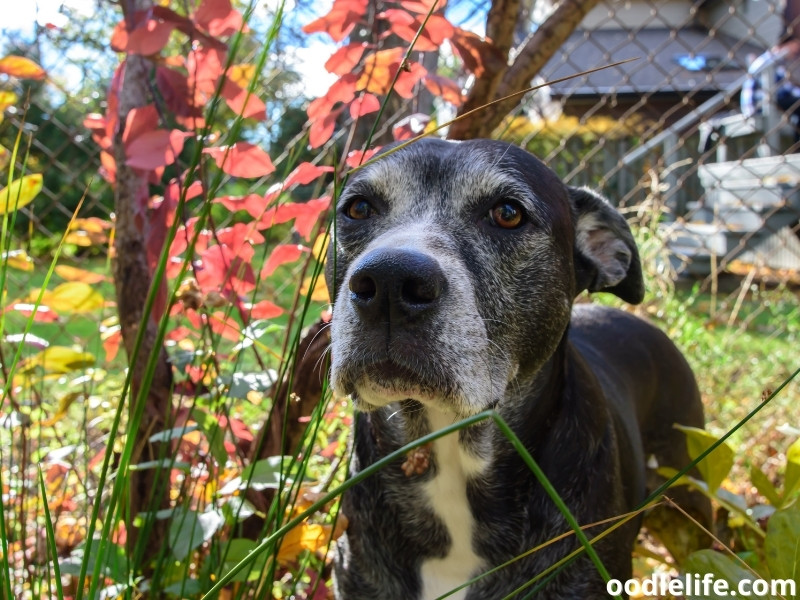
Training Your Puppy
Dogs will not always calm down when they get to a certain age, if they’re being put in situations they find stimulating or don’t have the previous learning then they’re going to do the wrong things no matter what their age is. If you have a puppy that mouths but you never teach it appropriate things to play with instead of your limbs, they’re going to think there is nothing wrong with their behavior.

Just like if you allow your dog to jump up when they greet you they’re likely to continue the behavior into adulthood so they’re just performing a normal greeting to them but other people might not enjoy this kind of reception.
Calming down doesn’t mean the same thing to everyone so you need to set your expectations based on what you want out of your dog. Does calming down mean relaxing out in public? Does calming down mean not using your arms as chew toys? Maybe calming down means having good social manners around other dogs and not having to play with every dog they see or throw a tantrum when they can’t say hello.
All of this takes training and doesn’t always come naturally to every dog.
Conclusion
When you take your eight-week-old puppy home, it’s hard to estimate when they’ll stop maturing. Just like humans, you can’t put it down to date but more of an estimation based on breed and environment. If you have a busy working breed, they’re likely to remain high-energy long term and might only slow down in their old age.
Working dogs are bred to have energy and also to be able to consistently work throughout the day. If you take home your Belgium Malinois puppy, don’t expect them to be lazy couch potatoes by the age of three, they’re still going to have a lot of drive and need to work because of their breed and nature. If you want a dog to enjoy sleeping throughout a lot of the day then rather than the age you may want to consider the breed.
By the time a Greyhound is fully matured, they are probably already going to be used to lounging on the couch for most of the day between shorter spurts of energy.
For a dog to be considered fully mature, they are around the age of eighteen months to two years. This is around the time that dogs become an adult and they aren’t being flooded with hormones anymore. Smaller breeds mature faster and may calm down quicker but you can’t just rely on age for them to calm down, there’s also a level of training and socializing to help your dog be calm in different environments.